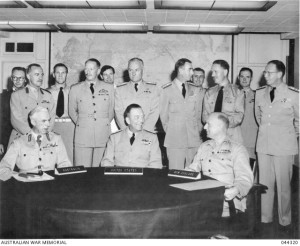The Australia, New Zealand and United States Security Treaty (ANZUS Treaty) is an alliance partnership that was formalized in 1951 to protect the security of the Pacific region in the post-WWII/Cold War era. At the height of the Second World War, Great Britain was unable to adequately aid in the defense of its Commonwealth protectorates and colonial empire against Japanese conquests in the East Asia/Pacific region; thus, the countries of Australia and New Zealand, concerned over the threat of future Japanese aggression and/or the rise of communism in the Indochinese Peninsula, sought a formal alliance with the United States in order to ensure the security of the region.
In the 21st century, the strategic purpose of the ANZUS alliance remains unchanged, however, the relevance of the partnership has become a point of contention between its signatories amidst the rise of Asia and, in particular, China – politically, economically, and militarily. The future of the ANZUS alliance will depend on how Australia and New Zealand choose to navigate their relationship with China and, subsequently, the United States. In terms of security dependence, it would be in the national interest of the Antipodean states to maintain cooperative military agreements with the U.S.; but in regard to economic interdependence and multilateral diplomacy in East Asia, ANZUS alliance Member States may choose to defy the regional hegemony of the U.S., which would have profound impacts on the international system. In this connection, the preservation and longevity of the ANZUS alliance possesses a direct correlation to the maintenance of the post-Cold War unipolar system, in which the United States asserts relative dominance. The dissolution of the ANZUS alliance would require the U.S. to reevaluate and redefine its strategic role in the East Asia/Pacific region and/or, perhaps, accommodate for the shift in the balance of power to an international system characterized by U.S./China bipolarity.
The current status quo is defined by U.S. domination of maritime East Asia alongside Chinese domination of its mainland borders, and incorporates the U.S. maritime containment strategy or ‘naval encirclement’ of China. The primary geopolitical concern today is whether or not China will seek to develop its maritime power-projection capabilities in direct confrontation to U.S. interests and unipolar supremacy, now that China has secured its vital continental interests and borders on its entire land periphery. The survival of the ANZUS alliance will depend on “a mutual understanding about the ‘red lines’ for Chinese behaviour; continuous political and operational assessments of Chinese intentions, actions and capabilities; concrete political and military contingency planning involving China scenarios; and coordination of diplomatic responses, including the military, to Chinese activities in the Western Pacific”.
All future multilateral engagements between the ANZUS alliance (U.S.) and China must be conscious of the national interests of Australia and New Zealand, among which include regional peace, security, and stability, as well as middle power political dynamics. Furthermore, Australia and New Zealand must seek to maintain their foreign policy themes of middle power multilateralism, commitment to alliance partners, and cooperative regional engagement with Asia in order to navigate their triangular relationship with the U.S. and China, as well as adhere to the ANZUS Treaty.
The ANZUS alliance is akin to the theoretical defensive alliance expressed by Brett Ashely Leeds in “Do Alliances Deter Aggression? The Influence of Military Alliances on the Initiation of Militarized Disputes” wherein the states signatory to the defensive pact agree to provide active military support in the event of foreign aggression. In this context, “potential challengers” are less likely to initiate armed disputes with an intended target if that state, in particular, has strong and reliable allies that will come to its aid when faced with an existential threat to its security or sovereignty. In addition, potential aggressors would be more reluctant to initiate an armed conflict if the costs of a bilateral/multilateral dispute were significantly higher than the benefits, and/or if the possibility of victory was unrealistic.


I think the Pacific Ocean has become more and more unstable in part because of China’s ambition to foray there. In Japan, the Security Bills were approved by both lower and upper houses, respectively in July and September, which allowes Japan to exercise the right of collective-self defence. For this reason, Japan is more likely to be concerned with the Pacific security policy with ANZUS members, which I think is a good thing.
LikeLike